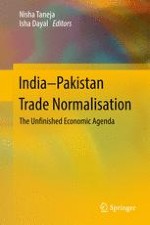2017 | OriginalPaper | Chapter
8. India’s Informal Trade with Pakistan
Authors : Nisha Taneja, Samridhi Bimal
Published in: India-Pakistan Trade Normalisation
Publisher: Springer Singapore
Activate our intelligent search to find suitable subject content or patents.
Select sections of text to find matching patents with Artificial Intelligence. powered by
Select sections of text to find additional relevant content using AI-assisted search. powered by
